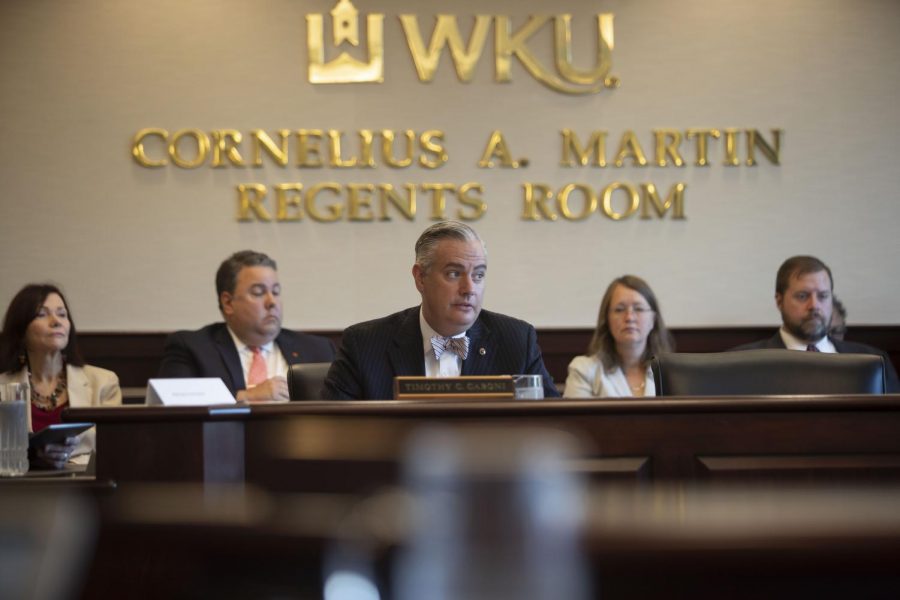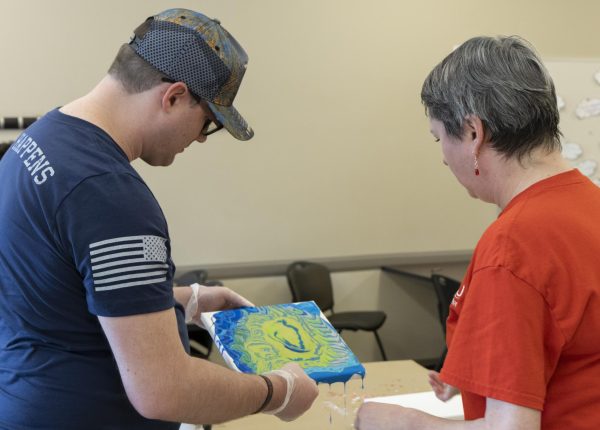Board of Regents approves WKU’s 10-year strategic plan
August 3, 2018
The WKU Board of Regents approved the strategic plan, shaping the university for the next decade.
Described as the “roadmap” of the university, the strategic plan was designed to plan out the next 10 years of the university and aimed at improving student enrollment and retention. Its creation took place over the last year with six working groups meeting throughout the year.
“This is intended to be a living, breathing document, not set in stone,” Phillip Bale, board chair, said, regarding the strategic plan.
The 2018-28 strategic plan includes three sections: the students, the university and the community. For every part, the plan provides goals, strategies and metrics, or ways of measuring the success of the goals with possible targets for 2027-28.
President Timothy Caboni said that creating the plan was a “semi-herculean task” and he wanted to echo his appreciation for the co-chairs and members of the steering committee and working group for developing the plan.
“I think what we have in front of us, and I think we had the full discussion yesterday, is not just a roadmap for where we are, but an aspirational piece that will help set the tone for how the university climbs to greater heights in the next decade,” Caboni said.
The board discussed the strategic plan during its annual retreat on Thursday, and it unanimously approved the plan during its quarterly meeting on Friday.
Before its approval, however, faculty regent Claus Ernst stated that he received several emails from concerned faculty members over the strategic plan’s centralized advising program, which was a topic of discussion during Thursday’s retreat.
The “Comprehensive Advising Program” focuses on first-and-second-year students and addressing their academic, financial, physical, mental and social questions, according to the plan.
Ernst asked Caboni if faculty members will be allowed to use their current method of advising. He said they are worried that centralized advising would not be as beneficial to the students because central advisers may not be able to answer students’ questions for a specific major or department.
WKU’s current advising method includes professors meeting individually with students about their class schedules within the colleges.
Caboni said that he understood and appreciated those faculty members’ concerns and he said that he will be mindful to them.
“If what we have now was working, then our retention rate would not be what it is,” Caboni said, regarding the university’s current method of advising.
At the start of the meeting, staff regent David Brinkley and regent Linda Ball were sworn in. Brinkley was elected as staff regent on June 21 and assumed the position on July 1. Ball was appointed to WKU’s Board of Regents by Gov. Matt Bevin on July 27.
The board approved Billy “Doc E” Edwards for staff emeritus status. Edwards served WKU’s athletic department for 47 years and retired on June 30, 2017. He graduated from WKU in 1974 and 1976 and was inducted into the university’s Hall of Distinguished Alumni in 2016, according to WKU Athletics.
The board approved extending WKU’s head softball coach Amy Tudor’s employment contract until June 30, 2025 and approved allocating $215,000 from the Parking and Transportation reserve fund to refurbish two WKU buses.
Before ending the meeting, the board went into executive session to discuss WKU’s proposed or pending litigation and the future acquisition or sale of university property.
Nicole Ziege can be reached at 270-745-6011 and [email protected]. Follow Nicole Ziege on Twitter at @NicoleZiege.


















![Kallie Wood, a senior social work major, presents her dish as a part of the Afrolatinidad event on Monday, April 8, 2024. My dish has a little bit of Spanish influence [and] a little bit of African influence,” Wood said.](https://wkuherald.com/wp-content/uploads/2024/04/marlowe_afrolatinadad_02-600x400.jpg)






